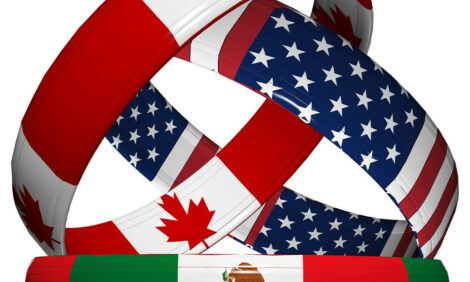



Canada-Korea Free Trade Deal: Good for Canadian Agriculture
CANADA - Canada and the Republic of Korea have concluded negotiations for a bilateral free trade agreement (FTA) that will significantly boost trade and investment ties between the two countries, creating jobs and opportunities for Canadians in every region of the country. Canadian pig meat will have tariff-free access to South Korea as a result of the FTA.The Free Trade Agreement, Canada’s first with an Asian market, will create thousands of new jobs in Canada and provide Canadian businesses and workers with a gateway to Asia, enhancing their global competitiveness. It will also level the playing field for Canadian companies competing with Korea’s other trading partners, including the United States and the European Union, who already have free trade agreements with Korea.
Canadian consumers will benefit from a greater variety of goods at lower prices, as the Free Trade Agreement will cover virtually all aspects of Canadian-Korean trade: goods and services, investment, government procurement, environment and labour cooperation, and other areas of economic activity.
The Agreement eliminates tariffs and reduces non-tariff measures that hinder market access for Canadian exporters and investors in Korea, bringing transparency and predictability to the business environment. Once the Agreement is fully implemented, Korea will remove duties on 98.2 per cent of its tariff lines, covering virtually all of Canada’s imports.
The Canada-Korea Free Trade Agreement will benefit a wide range of sectors, including industrial goods (e.g. chemicals and plastics, information and communications technology, aerospace, metals and minerals, etc.), agricultural and agri-food products, wine and spirits, fish and seafood, and wood and forestry products. The Agreement will also benefit Canada’s world-class services sector and strengthen opportunities and protection for two-way investment.
"Our Government recognizes the importance of opening new markets for Canadian goods, services and investment which is why we launched the most ambitious trade agenda in Canadian history. The Canada-Korea Free Trade Agreement will create jobs and open the door to the lucrative Asia-Pacific market for Canadian businesses. The Canada-Korea Free Trade Agreement not only reflects the input of all sectors of the economy, provinces and territories, it will deliver significant benefits for Canadians from coast to coast to coast,” commented Canada's Prime Minister Stephen Harper.
“The Canada-Korea Free Trade Agreement will create jobs and opportunities for Canadians across the country. Not only will it benefit Canadian consumers, it is good news for farmers, the aerospace industry and the chemicals sector, to name a few. Canadian businesses, investors and consumers in every province stand to benefit significantly from the increased market access that the Agreement will provide,” Mr Harper concluded.
Agricultural and Agri-food Products
The agricultural and agri-food sector employed more than 585,000 people in 2012, accounting for close to three per cent of Canada’s GDP. In the same year, Canada was the world’s fifth-largest exporter of agricultural and agri-food products.
Canada’s annual agricultural exports to Korea were worth an average of C$708 million from 2010 to 2012, led by wheat, pork and pork offal, hides, skins and furs, refined and crude canola oil, malt and prepared foods. Canada will benefit from expanding exports of these and a wide variety of other products, including meats, grains, oilseeds and pulses. Canadian agricultural exports to Korea currently face high tariff rates, which averaged 52.7 per cent in 2012.
The Agreement will result in the elimination of tariffs on 86.8 per cent of agricultural tariff lines. This duty-free access will give Canadian agricultural products, including beef, pork, canola and grains, preferential access to the Korean market and will put Canada on a level playing field with Korea’s current FTA partners.
The Canada-Korea Free Trade Agreement will not affect Canada’s supply management system, which will remain as robust as ever. The supply management system and its three key pillars - production control, import controls and price controls - will remain intact. The Canada-Korea Free Trade Agreement provides no additional market access (i.e. no quota expansion and no reduction or elimination of over-access tariffs) for Korea’s dairy, poultry and eggs.
These benefits from the Canada-Korea Free Trade Agreement in the agriculture and agri-food sector will be of great benefit to all of Canada’s provinces.






